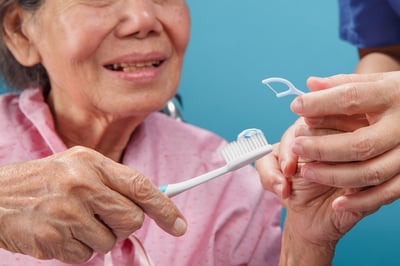 Dental health is important for people of all ages, but seniors and their caregivers sometimes have extra challenges when it comes to caring for teeth and gums.
Dental health is important for people of all ages, but seniors and their caregivers sometimes have extra challenges when it comes to caring for teeth and gums.
What are some of the challenges specific to seniors when it comes to dental wellness? And how can caregivers help ensure that their loved ones maintain a manageable routine?
Dental Challenges for Seniors
Let’s face it, not many people enjoy brushing and flossing. For seniors, however, maintaining dental health can be more than a mere inconvenience.
Age-related medical conditions, medications, dexterity problems, and other factors can cause oral health problems in older adults. Over time and without intervention, the combination of dental problems and poor dental care can lead to reduced quality of life outcomes for seniors—from difficulty chewing to changes in appearance.
According to Decisions in Dentistry, older adults experience significantly higher rates of tooth decay than younger people. Poor oral health has been linked to higher incidences of infections, and it can also aggravate existing conditions, such as heart conditions and diabetes.
As a society, we need to pay more attention to senior dental health by promoting strategies for disease prevention and management.
The Gum Disease Connection
One of the most serious reasons to keep teeth and gums clean is to prevent gum disease. Gum disease starts off as gingivitis, when a buildup of harmful bacteria causes the gums to become tender and swollen.
Gingivitis, if untreated, can progress to periodontitis, a serious condition where the gums recede and the roots of the teeth are exposed. Those nasty bacteria can attack the bone tissue and lead to tooth loss and infections.
In addition, gum disease has been linked to the following health issues:
-
Cancer. More than two-thirds of people who have pancreatic cancer also report having periodontal disease.
-
Diabetes. People with diabetes have a harder time fighting infection because the disease restricts blood flow to the gums.
-
Dementia. Some studies indicate that people with advanced gum disease perform poorly on memory tests. If the senior you provide care for has dementia, they may require additional dental care.
-
Stroke. When bacteria are present from periodontal disease, they can enter the bloodstream and cause hardening of arteries and damage to blood vessels. This increases the risk of stroke.
Preventing Gum Disease
Dentists recommend the following routine for preventing dangerous gum disease.
-
Brush and floss twice a day.
-
Use fluoride toothpaste.
-
Do not smoke or use chewing tobacco.
-
Avoid or reduce sugary drinks and foods.
-
Eat a healthy, well-balanced diet.
Denture Problems
Poorly fitting dentures—which can happen over time—can be uncomfortable and embarrassing. They can also interfere with daily activities, like eating and talking. Even worse? If left untreated, loose or awkward dentures can lead to poor nutritional habits and even social isolation.
Have your aging loved one's dentures checked routinely to ensure a proper fit. Additionally, make sure dentures are removed at bedtime and stored in fresh water to avoid warping. Scrubbing them daily with denture cream and a denture brush is also important, as fizzy tablets are insufficient. This mmlearn video helps explain the procedures for removing dentures and the residual adhesive residue.
Mouth Cancer
Mouth cancer, also called oral cancer, most commonly develops in older adults, and includes all cancers of the mouth, tongue, lips, and throat. At least once a month, caregivers can check for signs and symptoms of oral cancer: sores, white or red spots, and bleeding that continues for more than two weeks. If you notice any of these warning signs, follow up with your aging loved one's health care provider.
Dry Mouth
As we age, our bodies produce less saliva—a natural tooth-cleaning mechanism that helps protect teeth from dental problems. Some medications can make dry mouth worse. If your aging loved one is experiencing dry mouth, ask your health care provider about over-the-counter artificial saliva.
Rinsing throughout the day, lip moisturizers, and moistening food by dunking are other effective strategies to cope with dry mouth.
Tips for Caregivers
Seniors today are enjoying better oral health than previous generations due to changes in behavior and self-care, improved access to treatment, and advancements in dentistry. Caregivers can assist their loved ones by participating in the process.
-
Visit the dentist. Caregivers can help seniors maintain healthy teeth and gums by encouraging them to visit the dentist regularly. Routine dental visits are a vital part of diagnosing and proactively treating common senior dental issues, such as xerostomia/dry mouth and changes to dexterity. If they are resistant to visiting the dentist, offer to accompany your loved one at their next visit.
-
Swap toothbrushes. For people experiencing changes to dexterity or dry mouth, replacing a manual toothbrush with an electric one can help.
-
Follow best practices. Twice-daily brushing, limiting sugar intake, and avoiding smoking are all ways to promote optimal oral health. Fluoride is usually associated with children, but high-risk seniors can also benefit from fluoride treatments.
-
Monitor for changes. Keep watch for changes in tooth and gum health, including sensitivity, difficulty chewing or swallowing, and new bumps, lesions, or swelling; these may indicate underlying problems.
-
Practice empathy. Losing the ability to properly maintain their teeth isn't just a physical issue; it can also affect a person’s self-image. It’s important to approach them with empathy and compassion when helping seniors cope with tooth loss, dental disease, and other oral health issues.
Something to Smile About
Some seniors start to slack off on dental hygiene as they age, but oral care continues to be important all throughout our lives.
When caregivers, medical professionals, and seniors are all involved in the process of maintaining a healthy oral care routine, we all have something to smile about.

